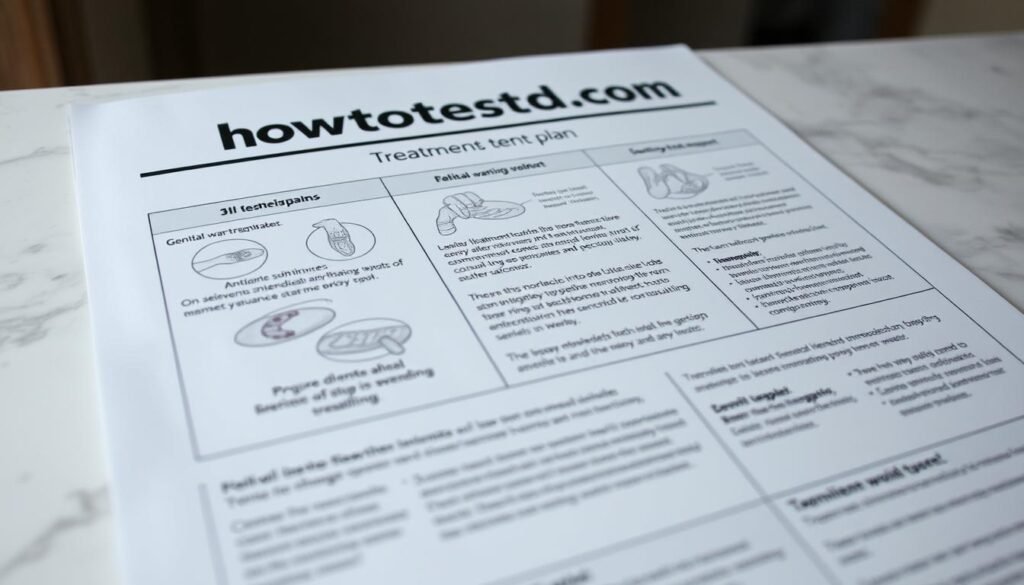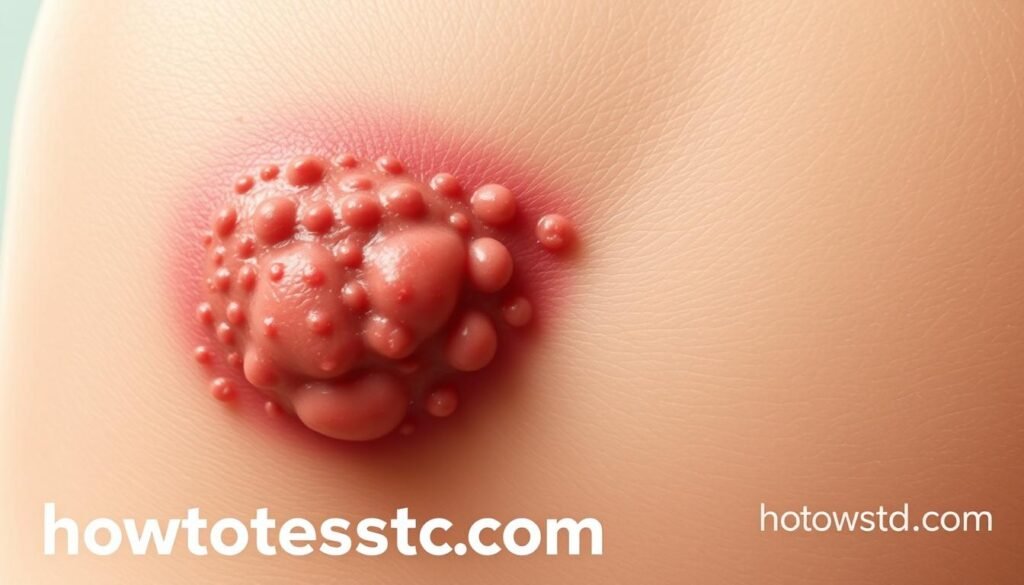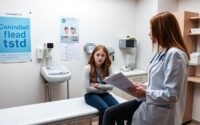Banish Genital Warts: Your Step-by-Step Removal Plan
Did you know genital warts are common? The CDC says millions get them every year. Getting treated is key to stop spreading them.
It’s important to take care of your health. Don’t wait to get tested or treated. This article will show you how to get rid of genital warts.
Key Takeaways
- Understanding the causes and symptoms of genital warts
- Exploring available treatment options for removal
- Learning how to prevent genital warts from recurring
- The importance of getting tested and treated early
- Tips for discussing genital warts with your healthcare provider
Understanding Genital Warts: Causes and Symptoms
It’s important to know about genital warts to treat them well. Genital warts are a common infection spread through sex. They are caused by certain types of the human papillomavirus (HPV).
What Causes Genital Warts?
Genital warts come from low-risk HPV types, like 6 and 11. HPV is very contagious. It spreads through skin contact during sex. It can also spread through close contact without sex.
Common Symptoms and Signs
Genital warts show differently in everyone. You might see:
- Small, flat, or raised growths on the genital area
- Warts can be flesh-colored, white, or pink
- They can appear alone or in clusters
- Itching or discomfort in the genital area
How Genital Warts Spread
Genital warts spread in a few ways:
| Mode of Transmission | Description |
|---|---|
| Sexual Contact | Direct skin-to-skin contact during sex |
| Intimate Contact | Contact without penetration can spread the virus |
| From Mother to Child | Rarely, HPV can be passed from mother to child during birth |
Knowing how genital warts spread helps prevent them. Safe sex and a strong immune system can help.
The Importance of Medical Diagnosis
Getting a correct diagnosis is key for treating genital warts well. It’s tempting to try to figure it out yourself or use treatments you can buy. But, the dangers of doing so are much bigger than any small benefits.
Why Self-Diagnosis Is Risky
Trying to diagnose yourself can lead to mistakes. You might think you have genital warts but really have something else. Or, you might think you have something else but really have warts. Also, using treatments you buy for warts on your private parts can hurt you more than help.
Key risks of self-diagnosis include:
- Misdiagnosis of the condition
- Inappropriate treatment
- Delayed treatment, potentially leading to complications
What to Expect During a Medical Examination
When you go for a check-up for genital warts, a doctor will look at your area. They might also ask about your health history and what symptoms you have.
A thorough examination is key for a right diagnosis.
Testing Options Available
There are many ways to check for genital warts correctly. These include:
- Visual diagnosis
- Acetic acid test
- Biopsy in uncertain cases
How to Get Rid of Genital Warts: Medical Treatment Options
There are many ways to treat genital warts. You can use creams, gels, or even surgery. The right treatment depends on the size and where the warts are. It also depends on your health.
Topical Prescription Medications
Topical creams and gels are often the first choice. Imiquimod and podofilox help your body fight the virus. They can also kill the wart itself.
Cryotherapy (Freezing)
Cryotherapy uses liquid nitrogen to freeze warts. It’s good for warts that don’t respond to creams. You might need more than one treatment.
Electrocautery and Surgical Removal
For big or stubborn warts, you might need electrocautery or surgery. Electrocautery burns the warts with electricity. Surgery cuts them out. Both are done under local anesthesia.
Laser Treatments
Laser treatments use a strong light to kill warts. It’s great for big or hard-to-treat warts. Lasers are precise, so they don’t hurt the healthy skin around.
| Treatment Option | Description | Effectiveness |
|---|---|---|
| Topical Prescription Medications | Stimulates immune system or destroys wart tissue | Effective for small to moderate-sized warts |
| Cryotherapy | Freezes warts with liquid nitrogen | Effective for warts resistant to topical treatments |
| Electrocautery and Surgical Removal | Burns or cuts off warts | Effective for larger or more persistent warts |
| Laser Treatments | Destroys wart tissue with high-intensity light | Effective for extensive or hard-to-treat warts |
Always talk to a doctor to find the best treatment for you. They can explain the good and bad of each option.
Over-the-Counter Treatment Options
OTC treatments are common for warts. But, they need careful thought for genital warts. They work well for common warts but not for genital ones without a doctor’s advice.
FDA-Approved OTC Treatments
Some OTC treatments are FDA-approved for warts. They have salicylic acid, which breaks down the wart. But, they’re not for genital warts.
Salicylic acid treatments come in liquids, gels, and pads. You apply them to the wart. Always follow the directions and be patient, as it takes weeks or months.
Effectiveness and Limitations
OTC treatments for genital warts are not very effective. They might not even be for the right condition. Without a proper diagnosis, they can make things worse.
How to Use OTC Treatments Safely
Follow the product’s instructions if you use OTC treatments. For genital warts, avoid applying to mucosa or open sores. Consulting a healthcare provider before starting is key for the right treatment.
In short, while OTC treatments exist for warts, they’re not safe for genital warts without a doctor’s help. Always get professional advice for safe and effective treatment.
Natural and Home Remedies for Genital Warts
Some people try natural and home remedies for genital warts. These methods are not proven to work for everyone. But, they might help manage symptoms or get rid of the warts.
Apple Cider Vinegar
Apple cider vinegar is a popular home remedy. It’s thought to burn off genital warts because it’s acidic. But, mix it with water first to avoid skin problems.
Tea Tree Oil
Tea tree oil is another remedy people use. It’s believed to fight the virus that causes genital warts. But, use it carefully and mix it with something else because it can irritate the skin.
Garlic and Other Natural Options
Garlic is also used for its antiviral properties. Some people put crushed garlic on the wart. But, it can be too harsh. Other options include aloe vera and eating foods that boost your immune system.
Scientific Evidence and Precautions
It’s important to know that these remedies might not work for everyone. There’s not much science backing them up. Some can even cause skin problems. So, talk to a doctor before trying any new remedy, like those for genital warts.
- Precautions to Consider:
- Always dilute essential oils and apple cider vinegar.
- Monitor for signs of irritation or allergic reactions.
- Consult a healthcare provider before starting any new remedy.
Knowing about natural and home remedies can help you make better choices. This way, you can decide what’s best for treating genital warts.
Creating Your Personalized Treatment Plan
A personalized treatment plan is key to managing genital warts well. It’s important to think about many things to find the best treatment.
Factors to Consider When Choosing Treatment
The size, where, and how many warts you have matter a lot. Your overall health is also important. For example, big warts might need stronger treatments like cryotherapy or surgery. But, small warts might just need creams or ointments.

Combining Treatment Approaches
At times, mixing treatments can work better. For example, using creams with cryotherapy can make treatment more effective. A doctor said, “Mixing treatments can lead to better results and lower the chance of warts coming back.”
Setting Realistic Expectations
It’s important to know what to expect when treating genital warts. Results can vary based on the person and the treatment. Knowing what might happen can help you stay on track with your treatment.
By thinking about these things and working with a doctor, you can make a treatment plan that works for you. This can help you manage genital warts better.
Preventing Recurrence and Transmission
After removing genital warts, you can take steps to prevent them from coming back or spreading. This is important for your health and the health of others.
Preventing genital warts involves medical care, lifestyle changes, and safe practices. These steps help keep you and others safe.
HPV Vaccination
Getting the HPV vaccine is a great way to stop genital warts. It protects against the HPV types that cause most warts and some cancers.
Safe Sex Practices
Safe sex is key to stopping genital warts from spreading. Using condoms can lower the risk of HPV. But remember, condoms might not cover all wart areas, so they’re not 100% safe.
Strengthening Your Immune System
A strong immune system fights off HPV and lowers wart risk. Eating well, exercising, and managing stress can boost your immune system.
Regular Check-ups and Monitoring
Seeing your doctor regularly is important. It helps catch any problems early. This way, you can get treatment quickly if warts come back.
| Prevention Strategy | Description | Effectiveness |
|---|---|---|
| HPV Vaccination | Protects against certain strains of HPV | High |
| Safe Sex Practices | Reduces transmission risk through condom use | Moderate to High |
| Immune System Strengthening | Helps body fight off HPV | Moderate |
Using these strategies together can greatly lower the chance of genital warts coming back or spreading. This helps keep everyone’s sexual health and well-being safe.
When to See a Doctor: Warning Signs and Complications
Knowing when to see a doctor is key for treating genital warts. Some cases can be treated at home. But, some need a doctor’s help.
Treatment Resistance
If genital warts medication doesn’t work, see a doctor. This means the warts might be tough to treat. They could need a stronger treatment.
Worsening Symptoms
Big or more warts mean you need a doctor. Also, if you have bleeding, itching, or burning, get help. These could mean something’s wrong or infected.
- Significant increase in wart size or number
- Bleeding or discharge from the warts
- Pain or discomfort in the genital area
Psychological Impact
Genital warts can make you feel stressed, anxious, and alone. If you’re struggling emotionally, talk to a doctor. They can help and offer support.

In short, knowing the signs and complications of genital warts is important. If you see any warning signs, don’t wait. See a doctor for the best genital warts treatment.
Addressing the Emotional and Psychological Impact
Genital warts can deeply affect a person’s mental health. They not only harm the body but also the mind. This can lead to big emotional and psychological problems.
Dealing with Stigma and Shame
Genital warts can make people feel shame and isolation. It’s important to remember, having genital warts is common. It doesn’t say anything about a person’s worth.
Getting genital warts treatment for men or using genital warts cream can help. It can make the physical symptoms better. This can also make the emotional pain less.
Communicating with Partners
Talking openly with sexual partners is key. Talking about genital warts can build trust. It’s a chance to teach others about it, too.
This can help reduce stigma. It makes for a more supportive environment.
Finding Support Resources
There are many places to find help for genital warts. Support groups, online or in-person, offer a safe place to share. Healthcare providers can also guide on managing the condition.
Dealing with genital warts’ emotional side is important. It’s about treating the whole person. Medical help and emotional support go hand in hand.
Conclusion: Taking Control of Your Health
Knowing how to get rid of genital warts is key. Getting medical help and following a treatment plan is important. This helps you manage and remove them.
Waiting too long can make things worse. It’s important to act fast. Look into different treatments like medical options, over-the-counter products, and natural remedies.
Using the right treatment and practicing safe sex helps a lot. Getting the HPV vaccine and keeping your immune system strong also helps. Taking care of your health means making smart choices and getting the right care.
FAQ
What is the most effective treatment for genital warts?
The best treatment for genital warts varies. It depends on the wart’s size, where it is, and how many there are. It also depends on your health. Doctors might use creams, freeze them off, or even surgery.
Can I treat genital warts at home?
You can try home treatments, but talk to a doctor first. Over-the-counter treatments might not work as well. Using them wrong can cause problems.
Are natural remedies effective in removing genital warts?
Some people think apple cider vinegar, tea tree oil, and garlic work. But, there’s not much science to back it up. They might also irritate your skin.
How can I prevent genital warts from recurring?
To stop warts from coming back, use protection during sex. Get the HPV vaccine. Keep your immune system strong. See your doctor regularly for check-ups.
Can genital warts be a sign of a more serious health issue?
Most warts are caused by low-risk HPV. But, sometimes they can mean a bigger problem like cervical cancer. A doctor can check and tell you what to do next.
How do I talk to my partner about genital warts?
Be honest with your partner about your warts. Explain what they are and how you’re treating them. This can help both of you feel better and support each other.
Can I get rid of genital warts without seeing a doctor?
You might try home treatments, but it’s best to see a doctor. They can give you the right treatment and help avoid bigger problems.
Are there any creams or medications that can cure genital warts?
Yes, there are creams and medicines for warts. But, always talk to a doctor before using them. They can make sure it’s safe and will work.
How long does it take to get rid of genital warts?
Getting rid of warts takes time. It depends on the treatment, how big and many the warts are, and your health. With the right treatment, you can get rid of them in a few weeks to months.


